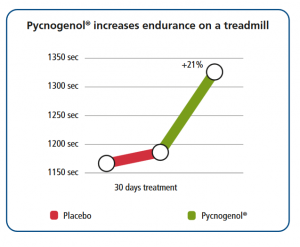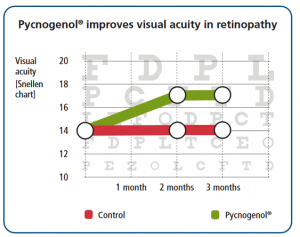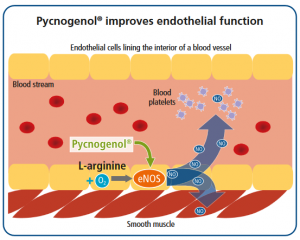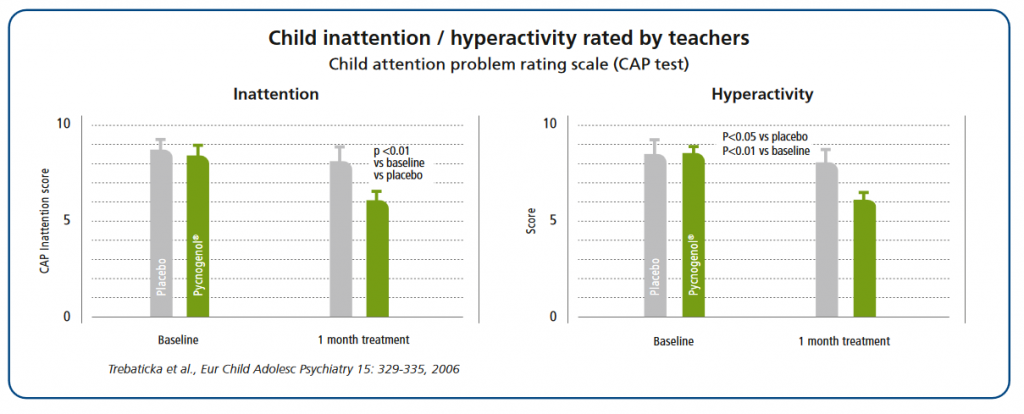Pycnogenol® is one of the most trusted, researched, and versatile dietary supplements.
 Isolated from French pine bark, Pycnogenol is a natural extract with a multitude of health benefits. This Pycnogenol review describes its benefits over standard pine bark extracts:
Isolated from French pine bark, Pycnogenol is a natural extract with a multitude of health benefits. This Pycnogenol review describes its benefits over standard pine bark extracts:
- Patented. Pycnogenol is the only pine bark extract patented to support overall health by combating oxidative stress.
- Clinically Researched. Pycnogenol is one of the most studied branded supplements with over 400 research papers.
- Established. Pycnogenol has been produced and researched for over 40 years.
Overview
Pycnogenol is a patented, clinically-studied extract from the bark of the French maritime pine tree produced by Horphag Research. Similar to standard pine bark extracts, the main active ingredients in Pycnogenol are procyanidins (also called proanthocyanidins), bioflavonoids, and phenolic acids.
These natural compounds act as powerful “super” antioxidants, helping counteract oxidative stress – a major contributor to not only a wide range of health disorders but also the process of aging itself. In addition, they also possess three other main benefits:
- Anti-inflammatory properties
- Helping produce collagen and hyaluronic acid, compounds essential to skin health
- Dilation of blood vessels
Because of these effects, Pycnogenol is advertised to support overall health and help with various chronic health disorders, and is currently included in more than 700 different supplements, cosmetics, and health products. Pycnogenol’s uses include protection of eye health, alleviation of diabetes, arthritis, erectile dysfunction, venous and circulatory disorders, improvement of exercise performance, skin care, and more.
However, while Pycnogenol has been researched for four decades – resulting in over 400 research studies and review papers with largely positive findings – it should be noted that the latest impartial review of its usefulness concluded that “Current evidence is insufficient to support Pycnogenol(R) use for the treatment of any chronic disorder.” 1

Pycnogenol Patents
Pycnogenol Preparation and Benefits
Pycnogenol was first patented in 1987 as an extract of maritime pine (Pinus pinaster) bark meant to alleviate the negative effects of oxidative stress, such as poor blood flow, inflammation, collagen degradation, and more (US patent 4698360). Its main active ingredients are proanthocyadins, which make up 65-75% of the extract.
This patent includes an extraction technique where 100 kg of pine bark is first made into a powder which is then extracted to create 250 L of liquid then is then cooled, filtered, and extracted several more times until 1 kg of powder containing 65%-75% of proanthocyadins – the main active ingredient – is left.
Erectile dysfunction
Pycnogenol is also patented for helping with erectile dysfunction in men, especially in combination with arginine, an amino acid known to promote blood flow. According to this patent, the proanthocyanidins present in Pycnogenol stimulate eNOS, an enzyme which in turn acts on arginine to promote the production of nitric oxide (NO) – a compound that widens blood vessels, which can improve erectile function (US patent 6565851).
Atherosclerosis
Pycnogenol Nutritional Supplement Uses

In addition to being sold by itself as a single-ingredient supplement purported to support antioxidant defenses, joint health, and blood circulation, Pycnogenol is included in various multi-ingredient products.
Workout Supplements
 Pycnogenol’s ability to enhance blood flow has made it a popular addition to pre-workout formulas. Enhanced blood flow is believed to improve performance, as showcased by studies reporting increased exercise endurance following Pycnogenol supplementation.
Pycnogenol’s ability to enhance blood flow has made it a popular addition to pre-workout formulas. Enhanced blood flow is believed to improve performance, as showcased by studies reporting increased exercise endurance following Pycnogenol supplementation.
In addition to its use as a performance enhancer, Pycnogenol is also utilized in post-workout supplements because increased blood flow may also help with recovery. In particular, several studies have reported that Pycnogenol supplementation helps reduce muscle pain and cramps after working out.
Joint Health Supplements
Studies have shown that Pycnogenol helps alleviate arthritis, prompting its increasing use in joint health supplements. In particular, research suggests that Pycnogenol inhibits the inflammation central to arthritis by suppressing NF-kB, the major pro-inflammatory pathway in the human body.
Vision Supplements
 Pycnogenol is a common ingredient in vision supplements because of two main research-backed benefits:
Pycnogenol is a common ingredient in vision supplements because of two main research-backed benefits:
- Helping fight high levels of oxidative stress in the eyes and the retina in particular, which contribute to macular degeneration and other eye disorders
- Supporting healthy circulation in the eyes, particularly by strengthening capillaries and preventing leakage, which is especially helpful for fighting retinopathy
Nootropic Supplements
Pycnogenol is commonly added to nootropic formulas because clinical research has shown that it enhances cognition and memory in particular in both young and older adults, and has also been shown to help with ADHD in children. Pycnogenol is proposed to aid the brain by enhancing blood flow through increased nitric oxide (NO) levels. More on Pycnogenol’s nootropic benefits.
Pycnogenol Brand Advantages
Pycnogenol is one of the most popular dietary supplement ingredients used in over 700 supplements and 80 countries. It’s advantages over basic pine bark extracts include:
- Research backing: Pycnogenol’s wide range of health benefits are backed by over 135 clinical trials and many more review articles
- Reliability: Pycnogenol is made from the bark of one tree species found in the same forest that is unspoiled and not exposed to pesticides, herbicides, or any other chemicals, resulting in a consistent, high quality product
- Safety: Pycnogenol’s safety is proven to by more than 70 clinical trials involving over 5,000 participants
Pycnogenol Research
Human Research
Pycnogenol has been demonstrated to benefit health in a multitude of ways, including cardiovascular health, exercise performance & recovery, diabetes, cognition, and arthritis.
 Pycnogenol (100 mg) may help alleviate type 2 diabetes
Pycnogenol (100 mg) may help alleviate type 2 diabetes
This double-blind, placebo-controlled, randomized study examined the efficacy of Pycnogenol in type 2 diabetes. A total of 77 participants were given placebo or Pycnogenol (100 mg) daily for 12 weeks. The Pycnogenol group experienced a reduction in HbA1(c) levels – a measure of blood glucose concentrations – and improved endothelial function, an important element of cardiovascular health.
- The researchers concluded that “Supplementation of Pycnogenol to conventional diabetes treatment lowers glucose levels and improves endothelial function.” 2
Pycnogenol (150 mg) appears to alleviate knee osteoarthritis
The efficacy of Pycnogenol for osteoarthritis (OA) was examined in this double-blind, placebo-controlled, randomized study. A total of 100 people with knee OA were given placebo or Pycnogenol (150 mg) daily for 3 months, while continuing to use nonsteroidal anti-inflammatory drug (NSAIDs). The Pycnogenol group improved on the WOMAC index, a measure of osteoarthritis pain, stiffness, and physical function, and also reported reductions in pain and NSAID use.
- The researchers concluded that “Pycnogenol in patients with mild to moderate OA improves symptoms and is able to spare NSAIDs.” 3
Pycnogenol (1 mg/kg) appears to improve ADHD in children
This double-blind, placebo-controlled, randomized study examined the efficacy of Pycnogenol in Attention Deficit/Hyperactivity Disorder (ADHD). A total of 61 children were given placebo or Pycnogenol (1 mg per kg of body weight) daily for 4 weeks. The supplemented group experienced a reduction in hyperactivity, improved attention, and visual-motor coordination and concentration.
- The researchers concluded that “Our results point to an option to use Pycnogenol as a natural supplement to relieve ADHD symptoms of children.“4
Pycnogenol (150 mg) appears to improve memory and antioxidant status in the elderly
This double-blind, placebo-controlled study examined Pycnogenol’s (PYC) effects on cognition and overall health in older adults (60-85 years). A total of 101 elderly participants were given Pycnogenol (150 mg) or placebo daily for 3 months. The Pycnogenol group experienced improvements in working memory and lipid peroxidation, a measure of oxidative stress.
- The researchers concluded that “…3-month intake of PYC has beneficial cognitive and biochemical effects for elderly individuals.“5
Pycnogenol (200 mg) appears to improve cardiovascular health in coronary artery disease patients
The effects of Pycnogenol on cardiovascular health were examined in a double-blind, placebo-controlled, randomized study. A total of 23 people with coronary artery disease (CAD) were given Pycnogenol (200 mg) or placebo daily for 8 weeks in addition to standard medication; they switched groups and repeated the experiment 2 weeks later. Pycnogenol supplementation improved endothelial function and oxidative stress.
- The researchers concluded that “…Pycnogenol improves endothelial function in patients with CAD by reducing oxidative stress.“6
Pycnogenol plus L-arginine appears to improve erectile function and testosterone levels in men
The goal of this double-blind, placebo-controlled, randomized study was to examine the effects of Prelox®, a formulation of Pycnogenol and l-arginine, on erectile dysfunction (ED). A total of 124 men (aged 30-50) were given Prelox or placebo tablets daily for 6 months. By the end of the study, the Prelox group improved on the International Index Of Erectile Function (IIEF) and in testosterone levels (15.9 nmol/L to 18.9 nmol/L).
- The researchers concluded that “…Prelox is effective for improving erectile function…this effect persists on continuous therapy for up to 6 months.” 7
Pycnogenol (150 mg) appears to halt retinopathy progression and improve vision
This double-blind, placebo-controlled, randomized study examined the efficacy of Pycnogenol in retinopathy – one of the leading causes of deteriorating vision. Twenty people with retinopathy were given placebo or Pycnogenol (150 mg) daily for 2 months, while another 20 were given the same Pycnogenol dose in a separate experiment. Whereas the placebo group’s retinopathy and vision got progressively worse, the Pycnogenol patients’ retinopathy remained stable and vision improved.
- The researchers concluded that “The results demonstrated a beneficial effect of Pycnogenol on the progression of retinopathy.”8
Pycnogenol (300 mg) appears to alleviate chronic venous insufficiency
This double-blind, placebo-controlled, randomized study looked at Pycnogenol’s effects on chronic venous insufficiency (CVI), a condition where veins in the legs have difficulty sending blood back up to the heart. A total of 40 people with CVI were given placebo or Pycnogenol (300 mg) daily for 2 months. The supplemented group experienced reduction or complete disappearance of edema (swelling), heaviness, and pain in the legs.
- The researchers concluded that “Pycnogenol® treatment induced a significant reduction in subcutaneous edema as well as heaviness and pain in the legs, on both after 30 and 60 days, the evaluation time periods.“9
Pycnogenol Dosage
- Standalone Pycnogenol comes in doses of 50 – 100 mg
- In multi-ingredient products, Pycnogenol is usually provided in doses ranging from 50 mg to 150 mg
- Research studies typically use dosages of 100 – 300 mg daily for 2-3 months
- Recommended Pycnogenol dosages for specific health benefits can be found here
Supplements in Review Recommendation
- Pycnogenol®, 150 mg.
Pycnogenol is one of the highest quality supplement ingredients available. Unlike most supplements – branded or unbranded – Pycnogenol is backed by over four decades of research, and has shown an impressively wide range of health benefits.
The ideal dose depends on your needs. Pycnogenol is used for many different reasons, all of which will dictate different dosages. For general health needs however, 150 mg daily is the recommended dose.

Leave a Reply